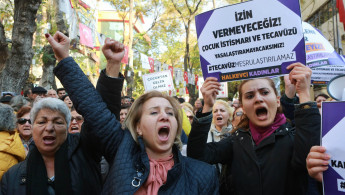Turkey pulls controversial child sex conviction bill
It follows an angry public backlash that saw thousands take to the streets in defiance of the government and its crackdown on dissent.
Critics had said the bill - which would allow the release from jail of sex assault convicts if they marry their victims - would legitimise rape of minors.
Its withdrawal back to commission for amendments marks a rare concession to popular opposition by the ruling Justice and Development Party (AKP), which has dominated politics since 2002.
"We are taking this bill in the parliament back to the commission in order to allow for the broad consensus the president requested, and to give time for the opposition parties to develop their proposals," Prime Minister Binali Yildirim said at a news conference in Istanbul.
"This commission will evaluate and take into account all sides and surely a solution will be found," the prime minister added.
'Compromise'
With the issue becoming a rallying cause for Turkey's embattled opposition, President Recep Tayyip Erdogan had earlier called for a compromise.
"Taking into consideration the criticism and recommendations from different sections of society, I see great benefit in solving this problem through broad consensus," he said, quoted on the official presidency website.
| Read also: Thousands rally against Turkish child sex conviction bill |
If the bill had passed, it would have permitted the release from prison of men guilty of assaulting a minor if the act was committed without "force, threat, or any other restriction on consent" and if the aggressor "marries the victim".
Opposition parties from across the political spectrum had heavily criticised the bill, which was approved in an initial parliamentary reading on Thursday.
It was expected to be put forward again in parliament on Tuesday but since last week, there have been protests in which thousands of people urged the government to withdraw the bill.
The main opposition Republican People's Party (CHP) had vowed to go as far as the constitutional court to block the legislation.
But the Turkish government emphasised the bill was not being entirely dropped and would be amended at commission level.
Amendments
Officials have insisted the draft legislation sought to ease a considerable social problem in a country where child marriage is widespread, especially in the southeast.
Defenders of the bill said it aimed to help families where a girl fell pregnant while she was younger than the age of consent, resulting in the jailing of the father for assaulting a minor.
The legal age of consent in Turkey is 18.
Yildirim said the proposals sought to help children in 3,800 families who "are forced to grow up without the love of their father" - likely imprisoned - and "paying for the mistakes of their mothers and fathers".
Family and Social Affairs Minister Fatma Betul Sayan said the bill was to be "reconsidered", vowing that the government "was absolutely against marriages at an early age".
"Taking into account the public's concerns, we want to pass this regulation with collective agreement," Sayan added.
"Our priority with this legislation was for the benefit of our children and to protect family integrity."
The bill will now be reviewed by parliament's justice commission, Justice Minister Bekir Bozdag, a staunch defender of the proposal, said on Twitter.
Gauri van Gulik, Amnesty International's Deputy Europe Director, said on Twitter the withdrawal was "good news" but told AFP the proposals should be rejected "once and for all".
Gulik added that the demonstrations showed that women's rights were not negotiable.
"The government should help these families with concrete measures rather than disturbingly linking suspending sentences to marriage in any way."
As well as opposition activists, the bill had also met with criticism from the pro-government Women's and Democracy Association (KADEM), whose deputy chair is Erdogan's younger daughter Sumeyye Erdogan Bayraktar.
Campaigners have long accused the government of failing to do enough to stamp out child marriage and of paying more attention to pushing up the birth rate.
Erdogan in June this year urged women to have at least three children and once described birth control as treason.





 Follow the Middle East's top stories in English at The New Arab on Google News
Follow the Middle East's top stories in English at The New Arab on Google News
![The UAE is widely suspected of arming the RSF militia [Getty]](/sites/default/files/styles/image_330x185/public/2024-11/GettyImages-472529908.jpg?h=69f2b9d0&itok=Yauw3YTG)
![Netanyahu furiously denounced the ICC [Getty]](/sites/default/files/styles/image_330x185/public/2024-11/GettyImages-2169352575.jpg?h=199d8c1f&itok=-vRiruf5)
![Both Hamas and the Palestinian Authority welcomed the ICC arrest warrants [Getty]](/sites/default/files/styles/image_330x185/public/2024-11/GettyImages-2178351173.jpg?h=199d8c1f&itok=TV858iVg)